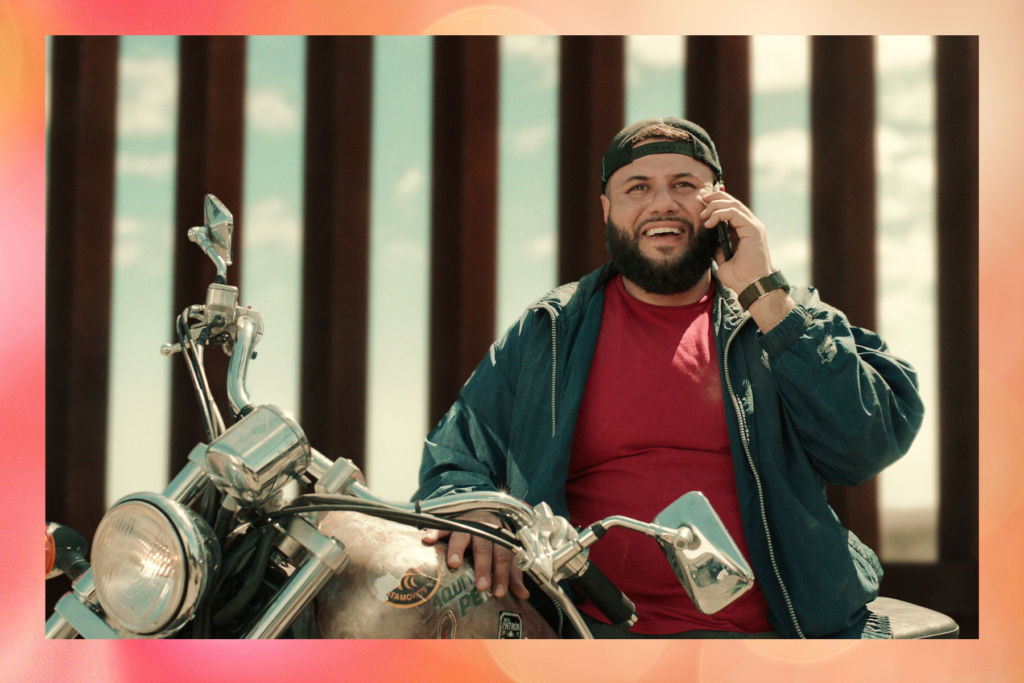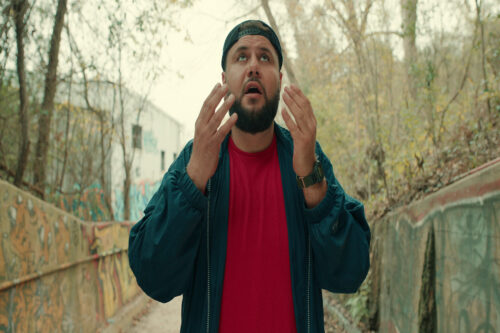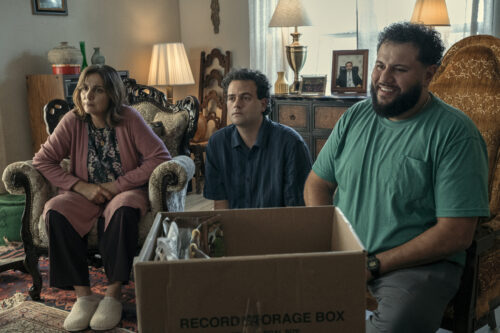
As a Palestinian American whose family emigrated from Kuwait as refugees when he was a child, comedian Mohammed “Mo” Amer has brought a unique perspective as an immigrant and Muslim to his stand-up routines. Now in his semi-autobiographical Netflix series “Mo,” Amer tells the tale of Mo Najjar as he and his family navigate the U.S. immigration system in Houston, Texas.
“Mo” is groundbreaking in many ways, including being the first series to have a Palestinian-American as the lead and the first to depict the story of a Palestinian family. Brown Girl Magazine sat down with Amer to discuss his experience as an asylee in the south, his relationship to his faith and culture, and the significance of bringing a show like “Mo” to the small screen.
This conversation has been edited for length and clarity.
We understand that “Mo” is loosely based on your life and your journey. What was it about the refugee journey that you wanted to share with the public? And why did you feel compelled to do so?
Man, there were so many things to touch about being a refugee and asylee to America; it wasn’t necessarily just one thing. It’s really complex and it’s layered. There was the obvious, which is the immigration and asylee part of it, and the immigration system and what it’s like to go through the asylee court. People usually think like, oh, you get your asylum and you’re a citizen, basically—well no, it takes 10 years after you get granted asylum alone. So there’s that piece, and then there’s the emotional one, the separation from your home and the generational trauma that comes with displacement and statelessness. There’s the Texas piece as well, as someone in Houston and from Houston and wanting to represent that properly. And then with each individual character, what they could go through. It’s just all these layers of, you know, the emotionality with each individual character and their origin stories, as well. It was a huge responsibility and to do that justice was something I did not take lightly.
A major aspect of “Mo” was the character Mo’s connection to Islam and his culture. How did your refugee journey and being in Texas affect your relationship with your culture and your religion?
That’s a great question. There are a lot of challenges, of course, with leaving a Muslim country and your relatives and your neighbors and your friends who are all similar to you in background. And what I would say is that, there were really challenging moments when we arrived in Houston—actually, challenging is kind of an understatement because it super difficult and sometimes gut wrenching—but faith is what truly got us through it, and continues to do so. Having that hope and understanding that in due time things do get better and figuring that out will make us stronger was a big part of that, and we wanted to showcase that, as well. Houston is the city that raised me, that embraced me, that cared for me. It’s the most diverse city in America and therefore created one of the most diverse friend groups for me. That made me a well-rounded human being for what I do today—not only traveling to 50 countries doing stand up, but being from Houston really prepped me for it.

What’s so relatable about “Mo” is that it involves people of so many backgrounds and you can see how similar Arab culture is to South Asian culture. Was there a specific audience you were looking to target when you made this show? Have there been any particular communities or people that have criticized the show?
There has been some criticism regarding the religious stuff, but it’s really minimal. It’s usually people who don’t have a proper understanding of how to tell a story. I consulted as many people as possible who were overqualified to do it, both on the political side and the religious side. I tried to keep it balanced as much as possible but in the end, you can’t appease everyone; you can’t please every single person. As far as who “Mo” was made for? This is like “FUBU” but “FUFU”—for us, for everyone, you know? That’s how I felt about making the show. This show is not just for Arabs or Palestinians or Muslims. This is an experience for anyone who’s felt like a fish out of water, who’s not being seen or heard. And it’s about that somebody who works day and night to try to live up to what they expected and their family’s expectations but falls short and in the meantime, they forget themselves and have all these, like, spiritual illnesses that are born out of this. Maybe they start self-medicating to find some kind of hope. But those are all the wrong answers and to find a way to dig deep and figure it out was really the goal for the characters and the growth for the whole season—finding the sore spots for everyone and how we can expand on those.
Season one ended on such a cliffhanger. It was such a wild ride, literally. What can viewers expect to see in season two?
I can’t share any of that right now, but we’re going to have to amplify everything like five or 10 times. I have some really great ideas, some really fun ideas for what we can do but it’s still super early.
What was kind of unexpected about “Mo” was that there were actually a lot of really emotional and dramatic scenes in the show. What was your thought process behind balancing the dramatic and comedic scenes, and was it difficult for you as a comedian to act in the more serious parts?
I didn’t find it hard at all to act in those scenes. It was so deeply rooted in my experience that I found it painful more than anything to relive some of those things and really cathartic, as well. There were some things I realized that I dealt with properly and there were some things that I realized that I didn’t deal with, or didn’t give them enough time that I kind of just buried and glossed over. The show gave me the opportunity to really experienced that emotion on camera, which made it a really natural experience—a painful one, but a good one—and it really seems like people are resonating with it deeply and connecting with it in a beautiful way. I had a lot of fear doing that, you know; it was like scary thing to do. Like in episode three with my dad. That’s a real thing for me, for my father—not necessarily the church scene and everything but it was just like, the content of it was so heavy. I realized after we filmed that scene just how many people were impacted by it in a deep way. So it’s a blessing to be able to do it. I’m just glad we did and I’m trying to honor my family and at the same time give the voice to the voiceless.
What is one piece of advice that you’d like to give other immigrants or people who are struggling to get through the immigration system?
The advice is just really holding firm and believing in yourself and not letting go of hope and your faith. I think people who have faith really grow in painful moments and those who have doubt will get stifled in deeply painful moments. So it’s really, really important to just ground yourself to get the help that you need, and I’m talking spiritually or with counseling or therapy to truly work through those things. Because, in the end, whatever you fear about getting that help is what’s holding you back. Allow the fear to push you forward and make you better rather than let it be your headwind. I forget where I heard that from, but I found it to be deeply profound. The moment that I let fear be my tailwind is the moment that I became successful, somebody forgot themselves. The moment I started writing something or putting a storyline together and then started getting worried or feeling anxiety about it, I knew I was heading in the right direction.
A big part of the show is how a Muslim family is being portrayed. Obviously, there haven’t been many portrayals of Muslim families in mainstream media. So what was your goal and what message do you hope the audience received from your portrayal?
I think it’s just some understanding, right? Viewers have never had a Palestinian lead in a show and to have three Palestinians playing Palestinians, whether it be my mom in the show, my sister in the show or myself, is such a groundbreaking thing. To have a face to who you are and just have some kind of common ground into that is what truly creates understanding, some sympathy, some empathy. When you start relating to a Palestinian family, that’s deeply powerful. That’s really it.

What advice would you give your former self or someone else who wants to follow in your footsteps?
Be patient. Stick true to what you want to do and your vision. It’s really important along with being a great collaborator, because sometimes people think that for you to execute your true vision, you have to be unbreakable in your vision. Remembering to not compromise your story and being a great collaborator are two different things. You have to combine the two to be great—you can’t just be like, “I don’t want to hear from anybody, I got this.” You have to be really open and understand what direction you’re trying to head in. Being open to ideas will enhance whatever vision you had for your story. And I love notes. I think there’s no wrong note, there’s no wrong question. If things don’t fit, you can just say they don’t fit. You have to make sure that you’re answering out of a place of sincerity, not a place from your ego. I think there’s a lot of artists and people with a particular vision who maybe don’t want to hear questions because they think they know exactly what it’s supposed to be. I did—I knew what the story was, but to have all these different perspectives just enhanced everything.
We all really worked hard to make sure that we never went away from my story and what I went through and to make sure “Mo” was grounded in that. And then the rest of it was just like great seasonings. It’s like you’re making a dish—I always think about this, I always go back to food which is such Arab thing to do—but it really is, right? It’s like when you’re making a dish, the seasonings, the balance of it is so important. If you put too much of one thing in it, it’s not easily digestible so you have to make it with simple ingredients. It’s really elevating simple ingredients. That’s what it’s really about. Next thing you know, you have a really great dish that people can consume really quickly and digest easily.
Are there any last words you’d like to share with Brown Girl Magazine and our readers?
Believe in yourself. Be patient. Don’t rush. Everybody wants everything today. It takes time to make something special and the more time you take, the better. If somebody does something before you, it’s okay. It’s an opportunity to be different and to be unique and original. So don’t worry. You have to be patient, believe in yourself and then just adjust as you go—be malleable. As Bruce Lee says, “Be like water.”
“Mo” is currently streaming on Netflix.
Feature image courtesy of Netflix.




